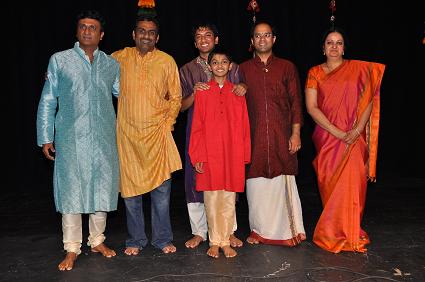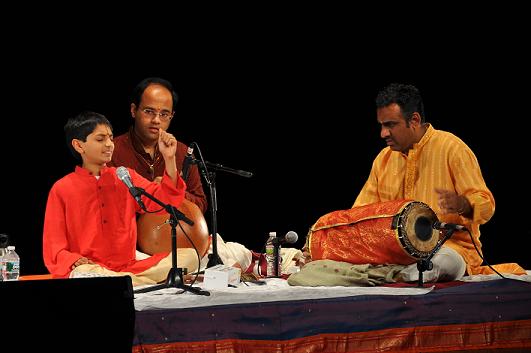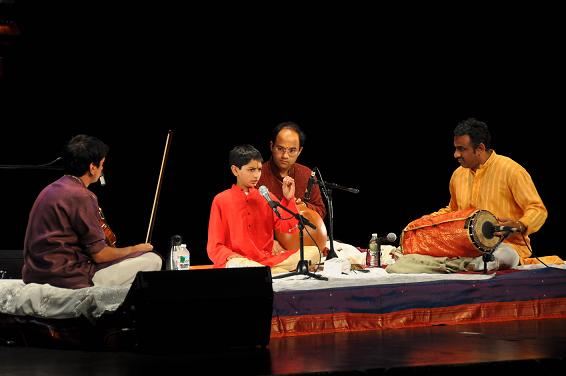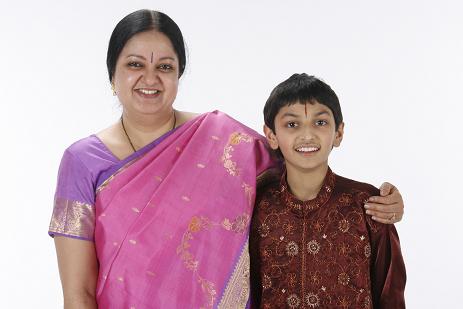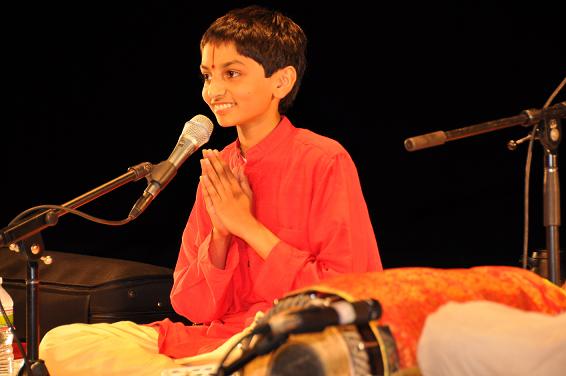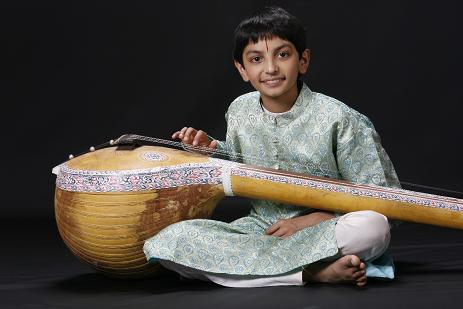Contribute
| Sudarshan Thirumalai - Vocal Arangetram |
Janani Giri Swamy
07/06/2011
Sudarshan Thirumalai, a student of Guru Smt. Tara Anand, presented his Carnatic vocal arangetram at the Sudbury Lincoln High School on June 26, 2011. He was accompanied on the violin by Sri Suhas Rao, on the mridangam by Sri Jayachandra Rao and on the ghatam by Dr. Ravi Balasubramanian. Sudarshan performed to an audience that included many of New England’s music gurus and connoisseurs. This included Dr. Pravin Sitaram, Sudarshan’s mridangam guru and the eminent musician Sriram Gangadharan, also Guru Tara’s brother, who has been providing Sudarshan with additional training. Sudarshan is the son of Ajai and Sridevi Thirumalai, who is one of New England’s most eminent Bharatha Natyam artists.
In her opening comments, Guru Tara introduced Sudarshan as the embodiment of a good student- his ability to “feel, experience and love Carnatic musicâ€, his “sharp musical intuition, his amazing dedication and his hard workâ€. Guru Tara also commented on Sudarshan’s complete “anubhavam†of music- the literal English translation of which is “experience†but which was so much more aptly given form by Sudarshan’s music. In the 4 hour concert that followed, Sudarshan demonstrated that he was a worthy shishya, fully deserving of his Guru’s praise.
Sudarshan’s concert illustrated the fundamental principles of good Carnatic music and the elements that characterize a good musician. Scholarly pathantharam grounded in classicism. An unshakable grounding in shruthi, swarasthanam and thala gnana and ucharippu or diction. A keen understanding of raga and manodharma. Effortlessness and confidence that belie the years of rigorous sadhanam. A repertoire that showcases a diversity of ragas, thalas, gathi and moods. Then there are the less tangible elements- musical intelligence and instinct, bhava and bhakthi that raise music from rendition and demonstration of technical skill to something so much more.
Sudarshan started his concert with a shlokam and varnam in lovely Andolika. This was followed by Vatapi Ganapathim, embellished with kalpanaswaras. Sudarshan then presented Nandagopala Krishnam, a composition of Narayana Theerthar in the ragam Panthuvarali. In the alapanai and the neraval and kalpana swara, Sudarshan captured the essence of Panthuvarali, with equal parts emphasis on the jiva swaras, in perfect unison with the shruthi, and brigha laden phrases. Next came Shyama Sastri’s Brova Vamma in lilting Neelambari and Sharavanabhava in sprightly Kannada.
Sudarshan then presented the grand Dikshitar composition “Sri Krishnam Bhajamanasa†in Thodi. Sudarshan’s presentation of Thodi was insightful and skillful as his voice traversed Thodi’s vastness from sweetness to roaring thunder. The composition was presented at a slow chowka meter and with a maturity and reverence that seemed far beyond Sudarshan’s 13 years. Sudarshan presented neraval and kalpanaswaram at the phrase “Sankha Chakra Gada Padma Vana Malamâ€, demonstrating creativity and understanding that is grounded in his own virtuosity and not faltering once in thala or kalapramanam.
This piece was followed by a thani avarthanam by the senior percussion artists for the evening. Despite the disruption caused by many of audience leaving the auditorium, Sri Jayachandra Rao and Sri Ravi Balasubramanian presented a masterful thani avarthanam which was a privilege to hear. The audience must remember that the percussion artists are the very foundation of a Carnatic music recital and that the Thani is an integral part of the kutcheri experience.
Following a Thyagaraja kirthanam in the rare ragam Sruthiranjani, Sudarshan presented Ragam Thanam Pallavi in the ragams Kambhodi and Hemavathi. The alapanai and thanam were replete with the beauty of these ragams, presented in unison without losing the essence of either. The Pallavi, “Lakshmi Nrisimha Namostuthe Hemavathi Sri Maha- Lakshmi..†was specially composed for this occasion by the renowned musician Smt. Suguna Purushottaman. Sudarshan presented the pallavi to perfection, weaving these two ragams together to create a seamless musical experience. This dazzling RTP was an illustration of the possibilities of carnatic music and of fresh innovation that can still be firmly rooted in classicism. A shower of chitta swarams followed in a medley of ragams.
The RTP was followed by the lighter tukkadas, during which Sudarshan sang with joyous abandon for the sheer love of music. These pieces spanned a variety of language, composers and moods. Of these, “Varugalamoâ€, a piece from Gopalakrishna Bharathi’s Nandanar Charithram, was rendered by Sudarshan with such emotion and yearning that he seemed to be directly addressing the Almighty. The recital concluded with Maharajapuram Santhanam’s Sivaranajani thillana and a mangalam in Jonpuri.
Suhas Rao, on the violin, was introduced by Guru Tara as a “pride and joy of the school†and as a mature musician in his own right. How better to describe Suhas than in the words of his own guru- a “rare and unique combination of talent, intuition, intelligence and work ethicâ€. Suhas’ music, simply put, is brilliant. He explores ragas through his own vision and skill and to their very edge but without compromise of even a single note to the classical pathanthara.
The senior percussionists for the evening supported Sudarshan with rhythm that in turn swayed, lilted and roared with the music. How lucky we and Sudarshan were to have them as a part of this recital.
The evening concluded with words of pride and blessings from Sudarshan’s gurus, Guru Tara, Dr. Pravin Sitaram and Sri Sriram Gangadharan. Smt. Sridevi Thirumalai conveyed heartfelt words of gratitude to all who were involved in Sudarshan’s musical journey. As I watched these gurus share their thoughts with us, it struck me that we are blessed as a community to have them to teach our children- not just because they are immensely accomplished artists, but such wonderful human beings with such humility and gracious bearing.
In concluding the evening, I found myself thinking of Guru Tara’s opening comments. From her descriptions of her students, it was clear how precisely Guru Tara understands their unique talents and abilities and how truly vested she is in each one. Guru Tara guides them with prowess and exacting discipline but also with tremendous effort on her part. An effort to not just teach music, but to make music a part of their very being- indeed, that divine “anubhavam†of music. Sudarshan’s achievement and his undoubted future as an accomplished Carnatic musician are a testament to what great things are possible under Guru Tara’s tutelage and with hard work and dedication- and I hope, an inspiration for the many children and parents who were present to share in this experience.
You may also access this article through our web-site http://www.lokvani.com/
